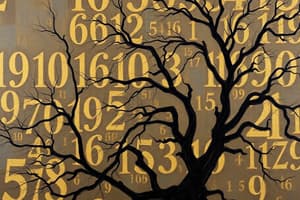Podcast
Questions and Answers
What is the term for the concept introduced by Ancient Babylonians that greatly simplified calculations?
What is the term for the concept introduced by Ancient Babylonians that greatly simplified calculations?
- Place value (correct)
- Fraction representation
- Base-10 system
- Positional notation
Which ancient civilization developed the positional notation system?
Which ancient civilization developed the positional notation system?
- Greek mathematicians
- Ancient Babylonians
- Ancient Egyptians
- Indians (correct)
In an integer number system, what property ensures that the order of addition or multiplication does not affect the result?
In an integer number system, what property ensures that the order of addition or multiplication does not affect the result?
- Distributive property
- Associative property (correct)
- Commutative property
- Closure property
Which base number system is commonly used in computing and data storage?
Which base number system is commonly used in computing and data storage?
Which property ensures that when an integer is added to zero, the result is the original integer?
Which property ensures that when an integer is added to zero, the result is the original integer?
In the context of number systems, which bases are commonly used in computer programming languages?
In the context of number systems, which bases are commonly used in computer programming languages?
Which new number systems offer unique properties for mathematical and physical problems?
Which new number systems offer unique properties for mathematical and physical problems?
Which number system is gaining popularity for specific applications as an alternative to the decimal system?
Which number system is gaining popularity for specific applications as an alternative to the decimal system?
Which property ensures that every integer has an opposite value in the addition process?
Which property ensures that every integer has an opposite value in the addition process?
In what context are IP addresses represented using binary, octal, and decimal number systems?
In what context are IP addresses represented using binary, octal, and decimal number systems?
Study Notes
Unleashing the Power of Number Systems
Number systems are the foundations of mathematics, ensuring we have a common language for quantifying the world around us. Our journey into the intricacies of number systems begins with a dive into the fundamentals, the history, and some modern applications.
The Numerical Toolkit
At their core, number systems consist of symbols and rules for performing arithmetic operations. We instinctively use the decimal number system, also known as base-10, in our daily lives. However, other bases—such as binary (base-2), octal (base-8), and hexadecimal (base-16)—are crucial for computing and data storage.
History of Number Systems
The evolution of number systems is closely tied to human civilization's development. Ancient Babylonians introduced the concept of place value, which greatly simplified calculations. Ancient Egyptians used a base-10 system, while the Indians developed the positional notation system. Greek mathematicians further advanced number systems to represent fractions and irrational numbers.
Properties of Integer Number Systems
Integer number systems, such as the decimal system, share several fundamental properties:
- Closure: Addition and multiplication of integers result in integers.
- Associative Property: Order of addition or multiplication of integers does not affect the result.
- Commutative Property: Addition or multiplication of integers in any order results in the same product.
- Identity Property of Addition and Multiplication: Zero Property of Addition and Multiplication of integers hold, meaning that adding or multiplying by zero leaves the original integer unchanged.
- Inverse Property of Addition: Every integer has an inverse (opposite) in the addition process.
- Order Property: Integers are ordered based on magnitude in ascending order: negative, zero, positive.
Modern Applications
Number systems have infiltrated our daily lives. For example, the Internet Protocol (IP) addresses are represented using binary, octal, and decimal number systems. Computer programming languages use base-2 and base-16, while base-10 remains popular for everyday calculations. The GPS system utilizes decimal numbers for coordinates, while the digital audio and video compression rely on numbers for efficient storage and delivery of media.
The Future of Number Systems
Beyond traditional number systems, new concepts are emerging. Quaternions and octonions are extensions of real and complex numbers, respectively, offering unique properties for mathematical and physical problems. Quantum computing leverages superposition and entanglement to process information using qubits, a new number-like entity. And although the decimal system remains a foundational tool, alternative bases like duodecimal (base-12) and sexagesimal (base-60) are gaining popularity for specific applications.
In the grand tapestry of mathematics, number systems provide the threads that weave together the fabric of understanding and innovation. As we continue exploring the depths and breadth of this realm, we will uncover new applications and perspectives that will shape the future of mathematics and the world we live in.
Studying That Suits You
Use AI to generate personalized quizzes and flashcards to suit your learning preferences.
Description
Embark on a journey through the captivating realm of number systems, from the basics of decimal and other bases to the historical evolution and modern-day applications. Discover the properties of integer number systems and delve into the future with emerging concepts like quaternions, octonions, quantum computing, and alternative bases.




